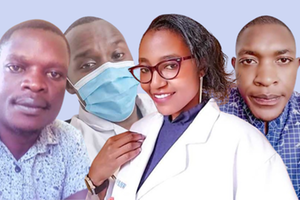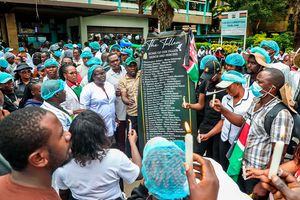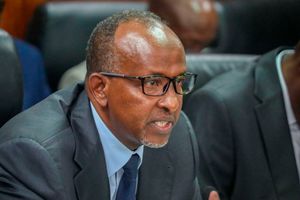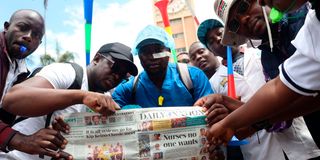
Universal Health Coverage (UHC) workers display a copy of the Daily Nation newspaper while protesting outside Parliament Buildings in Nairobi on May 21, 2025.
“My name is Abdullahi Ahmed Ismail. I am 28 years old and a Universal Health Coverage (UHC) staff. The Ministry of Health contracted and deployed me to the Covid-19 frontline as a nurse at Garissa County Referral Hospital in 2020.
Five years ago, when I was just 23, my life turned unexpectedly. I was injured in the spine while lifting and turning unconscious patients in the Intensive Care Unit (ICU) and High Dependency Unit (HDU).
What began as a persistent backache soon turned into an unbearable, stabbing pain, like sharp objects being driven into my lower back. Eventually, I lost feeling in my limbs.
Alarmed, I sought medical help. First came an X-ray, then an MRI.
The diagnosis? Loss of normal lumbar lordosis due to myofascial spasms, and L5/S1 disc desiccation. The radiologist also noted damage to my coxygeal bone.
The lumbar spine is the lower part of the back, made up of five vertebrae (L1–L5).
It supports the upper body and allows movement, flexibility and strength. When it is damaged, especially the L5/S1 disc – which sits at the base of the spine – it affects everything from mobility to the ability to stand or sit.
Many spinal conditions can be treated surgically or non-surgically. In my case, accessing that care has been a painful journey in more ways than one.
As a UHC employee, I don’t have medical insurance. I’ve had to dig into my pockets and rely on well-wishers for treatment even though I was injured while on the Covid-19 frontlines as I risked my life to save others through the simple yet dangerous acts of care – lifting, repositioning and supporting critically ill patients with no adequate protective gadgets or ergonomic support.
This is the reality of many UHC workers. We serve the nation but there’s no safety net to catch us when we fall.
At the height of the pandemic, the Ministry of Health called 8,571 of us, drawn from the 47 counties, to step up and save the country from a catastrophe.
I responded to the call without hesitation, signing a contract that promised a monthly stipend of Sh33,000, without any benefits, allowances or medical insurance.
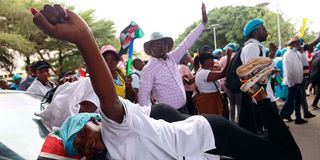
Universal Health Coverage (UHC) workers protests along Uhuru Highway in Nairobi on May 20, 2025.
Keeping millions of Kenyans alive mattered more than anything else at the time. I accepted the offer believing that once the country had weathered the storm, we would be absorbed by the devolved governments on permanent and pensionable terms, complete with gratuity.
I was handed a three-year contract and posted to Garissa County Referral Hospital on September 16, 2020. Without sufficient training in critical care, I was dispatched to the ICU.
My supervisors said they had no choice. Many healthcare workers had contracted the virus and the staff shortage was dire.
Despite the risks, I complied, holding on to the hope that permanent employment would follow. I had never worked in a government institution and was eager to serve, learn and help lift my family out of poverty.
But the job was far from easy. I worked with critically ill, often comatose patients. My team and I were responsible for lifting and turning them regularly, bathing them in bed, providing pressure care, changing diapers and performing every task necessary to keep a patient reliant on machines alive.
A year later, under the same UHC contract, I was transferred to the HDU. If the ICU was challenging, HDU was worse – not because of the patients, but the environment.
The HDU at Garissa Referral Hospital is a 16x16ft room with two beds. Patients are crammed together at times, some hooked to life-support machines, all fighting for survival in crowded and undignified conditions.
There is no changing room for staff, no separate toilet and no sluice room for handling soiled linen.
We had to carry waste across wards, navigating between doctors and patients. Privacy and dignity were non-existent.
Only one nurse could be in the room at a time, which made simple yet essential tasks like bed bathing a non-responsive patient almost impossible to do safely and effectively.
No structural improvements have been made to date.
We worked without proper diagnosis protocols, often finding out days later that we had unknowingly treated highly infectious Covid-19 or other communicable disease patients, without adequate protective gear.
I was down with the virus at least three times. Due to staff shortages, I never got a single day of sick leave.
My back constantly ached from the strain of bedside nursing yet I pushed on. There was no choice.
What hurt even more was the discrimination faced by UHC staff. Our colleagues earning more than Sh150,000 a month reduced us to beasts of burden. We were overworked, underpaid and dismissed.
Stress, burnout, depression and insomnia set in almost immediately.
I recently became a first-time father and husband – milestones that should have brought joy but instead filled me with fear and trepidation.
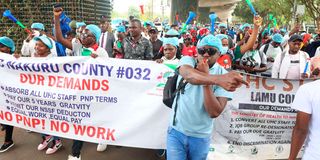
Universal Health Coverage (UHC) workers protests along Uhuru Highway in Nairobi on May 20, 2025.
I now go for physiotherapy daily at an age I should be enjoying my youth, not nursing endless pain.
Many UHC workers are still living hand-to-mouth, surviving on peanuts. My monthly stipend remains Sh33,000, far less than a third what my peers earn, yet we do the most laborious and emotionally taxing work.
Back in my village, I’m one of the few who made it through school. The community refers to me as “the well-dressed doctor.”
The village looks up to me but little do they know that I can’t even afford to feed myself, let alone support my wife and child.
This is why UHC health workers continue to camp outside Afya House and Parliament in Nairobi. It is not out of rebellion, but because we are desperate to be seen, heard and treated with dignity.
We gave our all to save this country and are simply asking that the country doesn’t forget us.


